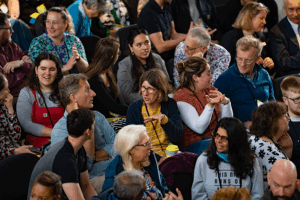Read / Feature
How do we become a church of missionary disciples?
Dave Gardner reflects on his first year as Missionary Disciples Project Manager of the Church of England’s Vision & Strategy Team.
Dave Gardner reflects on his first year as Missionary Disciples Project Manager of the Church of England’s Vision & Strategy Team.
Being a church of missionary disciples is one of the three priorities of our National Vision and Strategy. It empowers our other priorities, being younger and more diverse where a mixed ecology of church becomes the norm.
This is an exciting era to explore discipleship when there are signs of what the Bible Society describes as a ‘Quiet Revival’. Their research suggests dramatic growth, increased openness to Christianity and positive impact on physical and mental wellbeing.

This follows recent research commissioned by CCX amongst 18- to 35-year-olds on what causes spiritual growth, that highlighted the importance of developing worshipping communities that are characterised by trust and authenticity.
Since 2020 we have been advocating the importance of local churches becoming communities and hubs for initial and ongoing formation.
The concept of being a church of missionary disciples derives from our Catholic brothers and sisters. It is captured in Stephen Bevans recent book Community of Missionary Disciples. Bevans claims that ‘the Church’s essential missionary nature is the lens through which the Church is understood’. Mission is not some optional extra!
Bevans offers a definition of the church, which although long, is immensely powerful:
The Church is God’s pilgrim people,
called and gathered together by the Spirit in all its diversity,
in faith in the risen Christ, in order to embody, demonstrate and proclaim the reign of God,
which it believes was inaugurated in and through Jesus,
whose mission it shares and continues both within the church and within the world,
and celebrates in and is nourished by word and sacrament for its missionary life.
After a year’s research and conversations, I offer three ways we can engage in being a Church of missionary disciples.
1. Be the change you want others to be
Discipleship is ‘caught’ more than it is ‘taught.’ Jesus’ model of disciple-making is often described as an apprenticeship style. He shows what it is to be part of God’s mission in every aspect of his relationships. With the Father, with his followers and with the world. He models authenticity, trust, and appropriate vulnerability in all aspects. He builds a community of followers where he expects these same qualities to pervade.
This is no easy task, as the history of the Church and our experience can testify. Yet as the research demonstrates, building communities in which these qualities shape the culture will offer the greatest possibility for spiritual growth. This is especially important for those in leadership, as the nature of discipleship is relational. Therefore, how leadership teams relate to each other is what people notice the most. We need to model the change we want others to embrace.
In my last post I was privileged to be part of developing a leadership programme, Suffolk Ministry Development Programme. This engendered trust, built confidence and a greater willingness to minister together across different traditions. This has had a significant missional impact in the parishes of increased adult attendances and greater engagement with young families.
Whatever opportunity you have to lead, ensure that you build a culture where there is genuine co-creation, shared leadership with those you are seeking to influence, honest feedback and a continual willingness to learn.
 2. Focus on discipleship and the rest will follow
2. Focus on discipleship and the rest will follow
Being a church of missionary disciples empowers all other priorities. Whilst as a national Church, we continue to pay special attention to doubling the number of children and young people, we need to provide sustainable pathways for a lifetime of following Jesus.
We can do this by promoting different seasons of missionary discipleship using the Christian Calendar when we focus on four key imperatives of discipleship.
Abiding as disciples (Pentecost to August)
It is interesting how the principle of Sabbath is reemerging as an important discipline for discipleship. John Mark Comer lists this as the first of nine core practices that Practising the Way incorporates into a Rule of Life. I note that many of our local church and new worshipping community agendas are just too busy. What we need is a sustainable pattern that models key theological principles regarding worship, rest, and total dependence on God. Light programmes during the summer months with opportunities for holidays (holy days), retreats, pilgrimages, and festivals in the summer months can model abiding and discerning.
Making disciples (September to Epiphany)
An intentional focus through invitational events and services during Harvest, Remembrance, Advent, and Christmas in the autumn term that still has a resonance in a post-Christendom culture. Each worshipping community can offer an intentional opportunity for each member to be engaged in evangelism.
Growing disciples (Epiphany to Easter)
A period of deepening the faith of all can include those seeking for the first time, to explore what this means through introductory courses (Alpha, Start, Christianity Explored, The Discipleship Way Course), immersive experiences (Lenten disciplines; Mustard Seed) and one-to-one encounters. Existing members can be encouraged to step out of their comfort zone and assist in leadership, to study or experience an expression of Christianity beyond their tradition.
Sending disciples (Easter to Pentecost)
A time of celebration of new life through adult baptisms, confirmation, and renewal of baptismal vows. In my parish ministry I booked an annual confirmation service following Easter in the belief that God would bring about growth. The Holy Spirit equips us to be sent out to love and serve the world which we celebrate at Pentecost. A number of dioceses have developed tools to enable this exploration including Chelmsford’s version of the SHAPE framework and Oxford’s Gifts for everyday life. Rick Warren has some excellent materials to support whole life ministry in his Purpose Driven Life.
3. Intentionally provide a simple framework for individual discipleship development
Establishing and developing a rhythm of spiritual disciplines: This can include an intentional focus on a foundation period following baptism or confirmation. Core spiritual practices such as prayer, Bible reading and collective worship can be learnt or relearnt with the help of more experienced Christians. 
Engagement in mutual supportive and accountable relationships: This can include small groups that apply discipleship to everyday life with opportunities to dig a little deeper than worship services can provide. Some may benefit from spiritual direction and interaction with third order monastic resources.
Experimenting in sharing our faith in Jesus Christ in word as well as deed: We are all called to be witnesses about the change Jesus is making. We do this in our daily lives and intentionally through engagement with evangelistic opportunities. I warmly commend the Church Army programme Envoy, which helps individuals develop evangelism and effectiveness in living missionally.
Exploring our calling for life: Every disciple has a vocation, and it is the task of all those serving in ministry to help identify and nurture the gifts and callings of every member of the Church. This needs to be holistic, including all the marks of mission and value callings that proclaim God’s kingdom in areas of pastoral care, justice and care for God’s creation.
This is still a work in progress! In the months to come I hope to engage with many of you as we learn what it means to be a church of missionary disciples. Do get in touch so we can share what God is doing in making, growing, and sending disciples across the country: